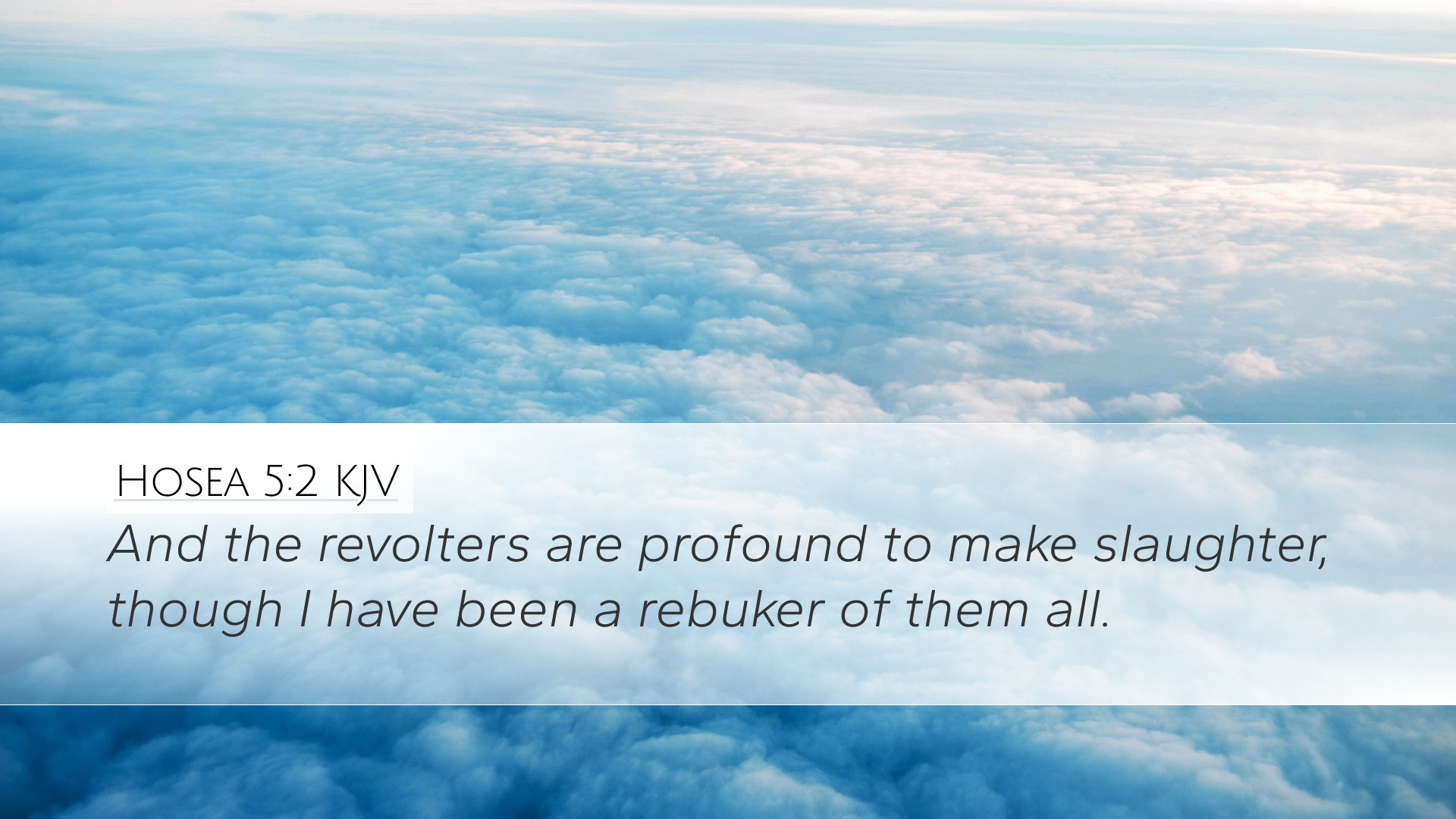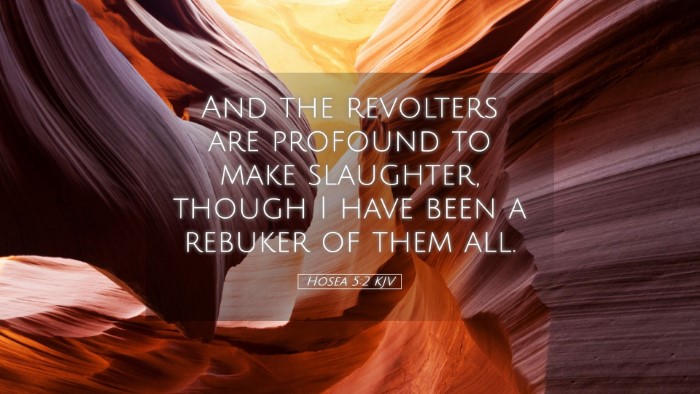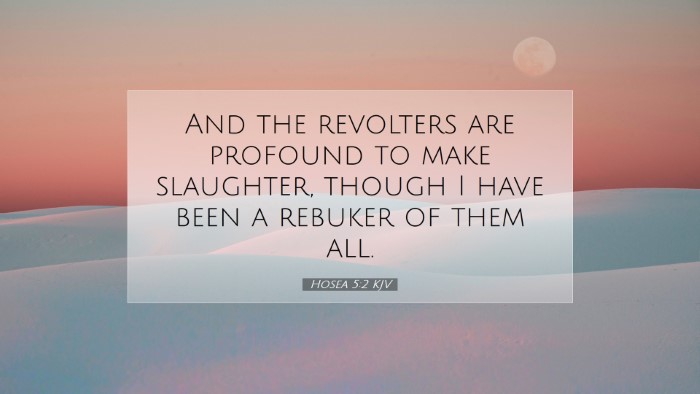Old Testament
Genesis Exodus Leviticus Numbers Deuteronomy Joshua Judges Ruth 1 Samuel 2 Samuel 1 Kings 2 Kings 1 Chronicles 2 Chronicles Ezra Nehemiah Esther Job Psalms Proverbs Ecclesiastes Song of Solomon Isaiah Jeremiah Lamentations Ezekiel Daniel Hosea Joel Amos Obadiah Jonah Micah Nahum Habakkuk Zephaniah Haggai Zechariah MalachiHosea 5:2
Hosea 5:2 KJV
And the revolters are profound to make slaughter, though I have been a rebuker of them all.
Hosea 5:2 Bible Commentary
Commentary on Hosea 5:2
Verse Text: “And the revolters are profound to make slaughter, though I have been a rebuker of them all.” - Hosea 5:2 KJV
This verse, situated within the prophetic ministry of Hosea, is rich in meaning and theological implications. It addresses the spiritual state of Israel, portraying a nation deeply entrenched in sin and rebellion against God. Below, we will explore insights from Matthew Henry, Albert Barnes, and Adam Clarke, aiming to distill their wisdom for contemporary pastors, students, theologians, and scholars.
Contextual Overview
Hosea prophesies during a time of great moral decay in Israel, marked by idolatry and social injustice. The opening chapters of the book highlight the infidelity of Israel, both in their covenant with God and their relationships with each other. This passage serves as a stark reminder of the consequences of neglecting God’s commands.
Insights from Commentators
Matthew Henry's Insights
Matthew Henry emphasizes the gravity of the offenses committed by the people of Israel. He points out that the “revolters” mentioned in this verse signify those who have turned away from God’s will, engaging in practices that provoke divine wrath.
- Rebellion and Its Consequences: Henry notes that the “profound” nature of their rebellion indicates a deep-rooted, sincere determination to continue in their sins, demonstrating that they are not merely casual transgressors but are actively engaged in slaughtering the innocent and perpetuating injustices.
- God’s Response: He insists that God’s rebukes have been numerous and unmistakable. Despite these divine interventions meant to bring the people back to righteousness, they remain obstinate, suggesting an obstinacy that appears almost willful.
Albert Barnes' Interpretation
Albert Barnes provides a thorough examination of the text, focusing on the implications of divine judgment as reflected in the phrase “though I have been a rebuker of them all.” He brings several vital points into focus:
- God’s Rebuke: Barnes interprets this as an indication of God’s mercy. He asserts that the fact God warns them through prophets reveals His desire for their repentance rather than destruction.
- The Nature of the People’s Sin: Barnes elaborates on the cruelty of their actions, pointing out that the “slaughter” refers to both literal violence against their own people and spiritual decline through idolatry that leads to societal ruin.
Adam Clarke's Commentary
Adam Clarke gives a theological examination of the term “profound,” suggesting that it conveys a sense not only of depth but also of a diabolical ingenuity in their sinning. He remarks on the psychological aspect of their rebellion:
- Intentionality of Sin: Clarke emphasizes that their sin is not accidental or mindless; rather, there is a studied effort to engage in sin despite divine admonitions.
- Finality of Judgment: Given their unrepentant state, Clarke warns of the certainty of impending judgment. This serves a dual purpose: a warning to the current generation and a lesson for future readers about the consequences of persistent rebellion.
Theological Implications
The theological weight of Hosea 5:2 extends beyond its historical context, bearing significant implications for contemporary understanding of sin, divine justice, and mercy.
Sin and Rebellion
The text reveals a comprehensive view of sin as a multifaceted act of rebellion against God. Modern readers, particularly those in pastoral roles, can draw from this insight to help congregations understand the serious nature of their actions in relation to their covenant with God.
Divine Mercy and Justice
God’s continued rebuke, despite the people’s obstinacy, paints a picture of divine mercy that is patient yet firm. This aspect can inspire modern sermons that discuss God’s longing for repentance and the dangers of hardened hearts.
Application for Today
For today’s church, Hosea 5:2 is a call to introspection, encouraging believers to reflect on the nature of their faith and actions. It challenges the faithful to assess their commitment to God and the seriousness with which they take His commandments.
Conclusion
In summary, the insights from Henry, Barnes, and Clarke converge to present a profound commentary on Hosea 5:2. Their collective wisdom highlights the rebellious nature of sin, the patience of divine mercy, and the earnest call to repentance. For pastors, students, and scholars alike, this passage serves as a reminder of the enduring truth regarding the relationship between humanity and the Divine – a relationship that requires fidelity, recognition of sin, and a willingness to heed God's rebuke.


